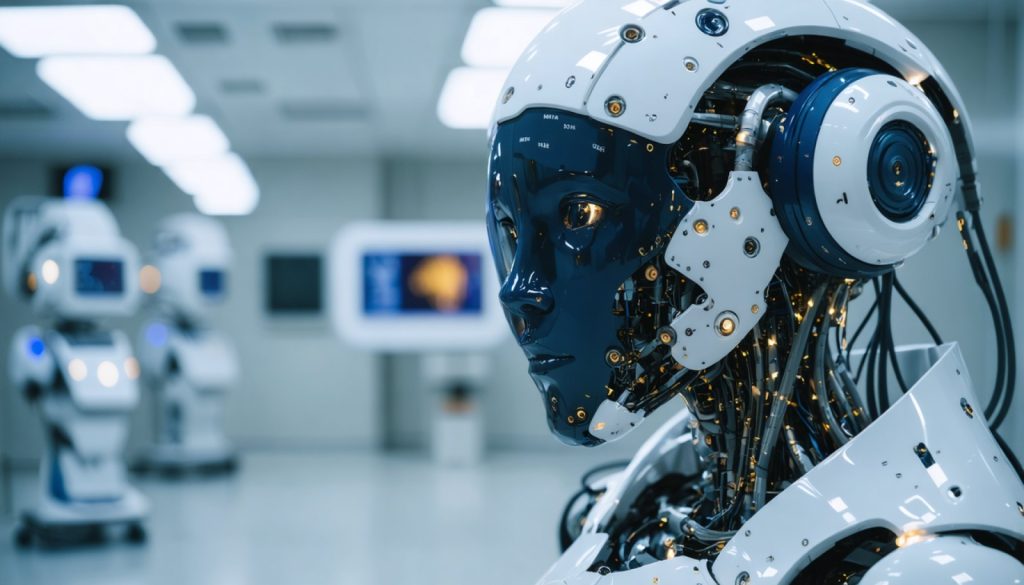
- Artificial Intelligence is transforming healthcare with innovations like AI chatbots achieving up to 90% diagnostic accuracy, signaling a shift towards efficiency and innovation.
- Excitement around AI in healthcare is tempered by skepticism due to unequal accountability; AI is often held to higher standards than human practitioners, posing ethical dilemmas.
- Critics argue AI lacks human qualities such as empathy and nuanced judgment, which are critical in medicine despite its proficiency in data analysis and pattern recognition.
- There are ethical concerns regarding the labor behind AI development, with much data curation outsourced to workers in suboptimal conditions in developing countries.
- AI’s limitations, such as inability to understand meaning and risks of “hallucination,” raise questions about the reliability and transparency of AI-driven models.
- The call for responsible AI innovation emphasizes aligning technological advancement with ethical guidelines to balance ambition and human dignity.
A whisper of optimism and skepticism surrounds the burgeoning role of Artificial Intelligence in healthcare—a domain fraught with complexity and high stakes. At the heart of this technological shift, AI chatbots are making waves, exhibiting diagnostic precision previously unimaginable. Bolstered by reports of astonishing accuracy, reaching up to 90% in some cases, these digital assistants are nudging traditional practices into a new era of efficiency and innovation.
Peel back the glossy surface of promotion, and you find a narrative weaving together awe and caution. Infosys co-founder Nandan Nilekani raises the flag on public perception, noting the disparity in expectations between humans and AI. While human errors are often met with understanding or amnesty, AI missteps—however minor—are subjected to fierce scrutiny. This unequal accountability poses ethical dilemmas, especially in critical areas like healthcare where lives hang in the balance.
Despite the cheerleading from tech moguls such as Bill Gates, who envisage a future where AI could potentially supplant human doctors, the debate remains fierce. Critics point out that while AI can excel in pattern recognition and data analysis, it lacks the nuanced judgment, empathy, and cogent reasoning indispensable in medicine. Human touch, the silent art of connecting emotionally and contextually with patients, remains beyond the grasp of AI’s binary nature.
Behind these digital luminaries stand the Laborers, who often toil unseen. The vast datasets feeding these AI systems are curated through hours of meticulous labor—much of it outsourced to workers in developing countries under less-than-ideal conditions. This raises uncomfortable questions about the ethical cost of AI’s rise; as the technology advances, so must our responsibility to those who fuel its growth.
A chorus of voices is emerging, cautioning against the hyperbole that typically accompanies AI advancements. Pioneers like Yann LeCun and critics including Gary Marcus eloquently argue that current AI models, driven by Large Language Models (LLMs), are confined by their inability to truly understand meaning or truth. Even amidst vast datasets, AI is prone to “hallucination” or fabrication, spurring concerns about reliability and transparency.
Stepping into this transformative phase, the crux of the AI debate lands not just on its technological prowess but on its societal impacts. Promises of achieving Artificial General Intelligence yield sensational headlines, and the specter of geopolitical rivalries fuels urgency and investment. Yet, these narratives often obscure vital issues like misinformation, cybercrime, and labor exploitation.
As we teeter on the edge of this digital transformation, the call for responsible innovation grows louder. AI’s potential to revolutionize fields like medicine is undeniable, but its development must align with tangible, ethical guidelines that shoulder both technological ambition and human dignity. The challenge lies in navigating a path where innovation and restraint walk hand in hand, forging a future neither wholly utopic nor blindly dystopic—a future grounded in authenticity and altruism.
Is AI Ready to Replace Doctors? The Truth Behind the Hype
The Role of AI in Healthcare: A Balanced Perspective
Artificial Intelligence (AI) is paving new pathways in healthcare, promising efficiency, precision, and the possibility of transformative innovation. However, the spotlight on AI in this sector is both illumined with optimism and clouded with skepticism. Reports suggest AI chatbots, often used in diagnostic scenarios, achieve accuracy rates as high as 90%, yet these numbers beg further exploration to understand the bigger picture.
Beyond the Algorithm: Ethical and Societal Dilemmas
One of the dominant criticisms regarding AI’s adoption in healthcare is its lack of empathy. While technologies excel at pattern recognition and data analysis, they falter on delivering nuanced human judgment. Medicine requires a deep emotional connection and contextual understanding, attributed historically to the human touch, which AI currently cannot replicate.
This limitation outlines the need for AI tools in healthcare to be designed as assistive rather than replacing technologies—augmenting human expertise rather than usurping it. Moreover, ethical questions arise from outsourcing labor to curate vast AI datasets, often shouldering on developing countries under bleak conditions.
Market Trends and Industry Forecast
The AI and healthcare market is anticipated to grow significantly, with forecasts suggesting a market size reaching $45.2 billion by 2026 (source: Markets and Markets). This growth trajectory emphasizes the need for the moral and sustainable development of AI tools, reflecting a commitment to ethical employment practices and responsible AI use.
Use Cases and Examples
AI’s implementation in healthcare is promising, with applications ranging from AI-driven radiology interpretation to personalized treatment plans via machine learning models. The success lies in integrating AI systems into existing medical workflows, ensuring they supplement—rather than interrupt—practitioner methods.
Challenges & Ethical AI Development
Critics, such as Yann LeCun and Gary Marcus, caution against over-reliance on large language models due to their limitations, such as “hallucinations”—instances when AI generates incorrect or misleading information. Transparency and reliability must become watchwords in AI’s development journey.
Enhancing AI Reliability in Healthcare: How-To Tips
1. Combine Human and AI Intuition:
Enable AI solutions that complement human intuition. Clinical decisions should emerge from a hybrid model where AI provides data insights and healthcare professionals add context and empathy.
2. Focus on Transparency:
Enhance the transparency of AI models by ensuring algorithms and datasets are open to peer review, bolstering trust among medical professionals and patients alike.
3. Prioritize Ethical Labor Practices:
Encourage companies to adopt fair labor practices, striving for equitable work conditions for all contributors who support AI innovations through data curation and maintenance.
Actionable Recommendations
– Educational Investment: Equip the next generation of medical practitioners with skills to utilize AI tools effectively.
– Regular Audits: Introduce regular audits to ensure AI systems in use follow ethical guidelines and maintain patient data security.
– Public Awareness: Increase public knowledge about AI’s role, potential, and limitations to build realistic expectations and foster trust.
Conclusion: Navigating the Future with Caution and Innovation
AI’s potential in revolutioning healthcare is undeniable, but it must tread carefully with adherence to ethical guidelines ensuring innovation sustains and uplifts human dignity. A balanced approach, where AI supports healthcare professionals without overshadowing them, stands as the most prudent path forward.
For more insights into AI and its intersection with the healthcare sector, visit IBM and learn about ongoing developments and ethical AI initiatives.



